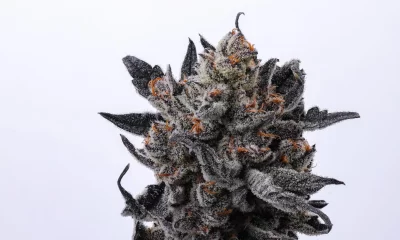Government
Louisiana Senate Approves Bill Allowing Public Employees to Use Medical Pot

A bill that would ban discrimination against state employees who use medical cannabis was approved by the Louisiana Senate on Wednesday, sending the legislation to the governor’s desk for his approval.
The Louisiana state Senate voted 26-8 on Wednesday to approve a bill that would protect public employees who use medical cannabis from job discrimination. The measure, House Bill 988, was approved by the Louisiana House of Representatives last week and now heads to the desk of Governor John Bel Edwards for his consideration.
Under the bill, public employees using medical cannabis with a doctor’s recommendation and in accordance with state law are protected from being fired for using medical pot. The bill also protects medical cannabis patients who are applying for state positions from being denied employment or other job discrimination based on their use of cannabis.
“This would basically be a first step to having laws on the books to protect people who have medical marijuana cards,” state Representative Mandy Landry, the sponsor of the bill, said last month after introducing the bill.
The bill does not apply to private employers or local government agencies, including police and fire departments. Landry told reporters that the legislation was limited to state employees to address likely opposition from politically powerful law enforcement and business lobbyists in the state Capitol.
Medical Cannabis an Alternative to Opioids in Louisiana
The Louisiana House of Representatives approved the bill by a vote of 60-32 on May 24. While the bill was up for debate in the House, Landry told her colleagues that the legislation would help prevent state workers from becoming addicted to opioids, an argument that was echoed in the upper body of the state legislature by Senator Stewart Cathey.
“There are a lot of people who don’t want to take opioids for their long-term PTSD and pain management because of the high possibility of addiction to opioids,” Landry said when the bill came up in a House committee last month. “This has proved to be a better option than them.”
The bill faced opposition from some lawmakers in the House, who argued that the legislature should not be drafting policy for state workers. Representative Larry Frieman said that such tasks should be carried out by the state Department of Administration. Jacques Berry, the communications director for the agency, noted that the Department of Administration has policies that protect its employees that use medical cannabis. But he added that the department does not have the authority to create employment policy for all state agencies.
State Representative Ed Larvadain supported the bill, suggesting that more work on cannabis policy reform is yet to come.
“We’re going to have to change how we deal with medical marijuana,” Larvadain said. “But this is a first step.”
Larvadain offered to work with Landry in the future to find a path that makes law enforcement officers and firefighters also eligible to use medical cannabis.
“A lot of those men and women have chronic pains because over the years they’ve had to climb through windows and police officers have been abused,” Larvadain said.
Medical cannabis advocates including Kevin Caldwell of the Marijuana Policy Project also supported the bill.
“The fact is we have an opioid problem that gets discussed in this building all the time,” Caldwell said. “We are seeing that for a lot of patients, medical cannabis is an exit strategy.”
Tony Landry of the Veterans Action Council noted that police officers and firefighters are not able to take CBD because of the risk that trace amounts of THC “can accumulate in your body over time and cause a positive test. I’m in favor of this bill, and I just think we need to leave no employee behind.”
Louisiana legalized medical cannabis for patients with debilitating medical conditions in 2015, and sales of medicinal weed began in the state in 2019. The Louisiana Board of Pharmacy reports that the state has more than 43,000 registered medical cannabis patients. Last year, the governor signed legislation to decriminalize possession of up to 14 grams of pot, making such offenses only punishable by a fine of up to $100.
Business
New Mexico cannabis operator fined, loses license for alleged BioTrack fraud

New Mexico regulators fined a cannabis operator nearly $300,000 and revoked its license after the company allegedly created fake reports in the state’s traceability software.
The New Mexico Cannabis Control Division (CCD) accused marijuana manufacturer and retailer Golden Roots of 11 violations, according to Albuquerque Business First.
Golden Roots operates the The Cannabis Revolution Dispensary.
The majority of the violations are related to the Albuquerque company’s improper use of BioTrack, which has been New Mexico’s track-and-trace vendor since 2015.
The CCD alleges Golden Roots reported marijuana production only two months after it had received its vertically integrated license, according to Albuquerque Business First.
Because cannabis takes longer than two months to be cultivated, the CCD was suspicious of the report.
After inspecting the company’s premises, the CCD alleged Golden Roots reported cultivation, transportation and sales in BioTrack but wasn’t able to provide officers who inspected the site evidence that the operator was cultivating cannabis.
In April, the CCD revoked Golden Roots’ license and issued a $10,000 fine, according to the news outlet.
The company requested a hearing, which the regulator scheduled for Sept. 1.
At the hearing, the CCD testified that the company’s dried-cannabis weights in BioTrack were suspicious because they didn’t seem to accurately reflect how much weight marijuana loses as it dries.
Company employees also poorly accounted for why they were making adjustments in the system of up to 24 pounds of cannabis, making comments such as “bad” or “mistake” in the software, Albuquerque Business First reported.
Golden Roots was fined $298,972.05 – the amount regulators allege the company made selling products that weren’t properly accounted for in BioTrack.
The CCD has been cracking down on cannabis operators accused of selling products procured from out-of-state or not grown legally:
- Regulators alleged in August that Albuquerque dispensary Sawmill Sweet Leaf sold out-of-state products and didn’t have a license for extraction.
- Paradise Exotics Distro lost its license in July after regulators alleged the company sold products made in California.
Golden Roots was the first alleged rulebreaker in New Mexico to be asked to pay a large fine.
Source: https://mjbizdaily.com/new-mexico-cannabis-operator-fined-loses-license-for-alleged-biotrack-fraud/
Business
Marijuana companies suing US attorney general in federal prohibition challenge

Four marijuana companies, including a multistate operator, have filed a lawsuit against U.S. Attorney General Merrick Garland in which they allege the federal MJ prohibition under the Controlled Substances Act is no longer constitutional.
According to the complaint, filed Thursday in U.S. District Court in Massachusetts, retailer Canna Provisions, Treevit delivery service CEO Gyasi Sellers, cultivator Wiseacre Farm and MSO Verano Holdings Corp. are all harmed by “the federal government’s unconstitutional ban on cultivating, manufacturing, distributing, or possessing intrastate marijuana.”
Verano is headquartered in Chicago but has operations in Massachusetts; the other three operators are based in Massachusetts.
The lawsuit seeks a ruling that the “Controlled Substances Act is unconstitutional as applied to the intrastate cultivation, manufacture, possession, and distribution of marijuana pursuant to state law.”
The companies want the case to go before the U.S. Supreme Court.
They hired prominent law firm Boies Schiller Flexner to represent them.
The New York-based firm’s principal is David Boies, whose former clients include Microsoft, former presidential candidate Al Gore and Elizabeth Holmes’ disgraced startup Theranos.
Similar challenges to the federal Controlled Substances Act (CSA) have failed.
One such challenge led to a landmark Supreme Court decision in 2005.
In Gonzalez vs. Raich, the highest court in the United States ruled in a 6-3 decision that the commerce clause of the U.S. Constitution gave Congress the power to outlaw marijuana federally, even though state laws allow the cultivation and sale of cannabis.
In the 18 years since that ruling, 23 states and the District of Columbia have legalized adult-use marijuana and the federal government has allowed a multibillion-dollar cannabis industry to thrive.
Since both Congress and the U.S. Department of Justice, currently headed by Garland, have declined to intervene in state-licensed marijuana markets, the key facts that led to the Supreme Court’s 2005 ruling “no longer apply,” Boies said in a statement Thursday.
“The Supreme Court has since made clear that the federal government lacks the authority to regulate purely intrastate commerce,” Boies said.
“Moreover, the facts on which those precedents are based are no longer true.”
Verano President Darren Weiss said in a statement the company is “prepared to bring this case all the way to the Supreme Court in order to align federal law with how Congress has acted for years.”
While the Biden administration’s push to reschedule marijuana would help solve marijuana operators’ federal tax woes, neither rescheduling nor modest Congressional reforms such as the SAFER Banking Act “solve the fundamental issue,” Weiss added.
“The application of the CSA to lawful state-run cannabis business is an unconstitutional overreach on state sovereignty that has led to decades of harm, failed businesses, lost jobs, and unsafe working conditions.”
Business
Alabama to make another attempt Dec. 1 to award medical cannabis licenses

Alabama regulators are targeting Dec. 1 to award the first batch of medical cannabis business licenses after the agency’s first two attempts were scrapped because of scoring errors and litigation.
The first licenses will be awarded to individual cultivators, delivery providers, processors, dispensaries and state testing labs, according to the Alabama Medical Cannabis Commission (AMCC).
Then, on Dec. 12, the AMCC will award licenses for vertically integrated operations, a designation set primarily for multistate operators.
Licenses are expected to be handed out 28 days after they have been awarded, so MMJ production could begin in early January, according to the Alabama Daily News.
That means MMJ products could be available for patients around early March, an AMCC spokesperson told the media outlet.
Regulators initially awarded 21 business licenses in June, only to void them after applicants alleged inconsistencies with how the applications were scored.
Then, in August, the state awarded 24 different licenses – 19 went to June recipients – only to reverse themselves again and scratch those licenses after spurned applicants filed lawsuits.
A state judge dismissed a lawsuit filed by Chicago-based MSO Verano Holdings Corp., but another lawsuit is pending.
Source: https://mjbizdaily.com/alabama-plans-to-award-medical-cannabis-licenses-dec-1/
-

 Business2 years ago
Business2 years agoPot Odor Does Not Justify Probable Cause for Vehicle Searches, Minnesota Court Affirms
-

 Business2 years ago
Business2 years agoNew Mexico cannabis operator fined, loses license for alleged BioTrack fraud
-

 Business2 years ago
Business2 years agoAlabama to make another attempt Dec. 1 to award medical cannabis licenses
-

 Business2 years ago
Business2 years agoWashington State Pays Out $9.4 Million in Refunds Relating to Drug Convictions
-

 Business2 years ago
Business2 years agoMarijuana companies suing US attorney general in federal prohibition challenge
-

 Business2 years ago
Business2 years agoLegal Marijuana Handed A Nothing Burger From NY State
-

 Business2 years ago
Business2 years agoCan Cannabis Help Seasonal Depression
-

 Blogs2 years ago
Blogs2 years agoCannabis Art Is Flourishing On Etsy













